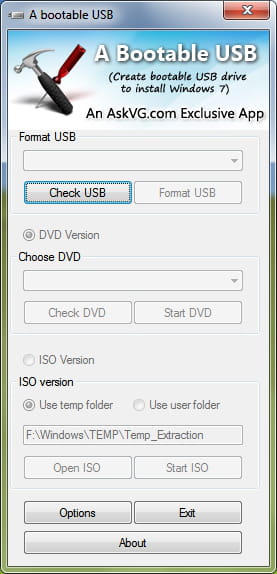Bootable Usb Program For Mac
- Mac Bootable Usb Windows 10
- Usb Boot Software For Mac
- Windows Bootable Usb Creator For Mac
- Bootable Usb Program For Linux
Windows xp bootable usb free download - BartPE Bootable Live Windows CD/DVD, Windows Bootable Image Creator, Style XP, and many more programs. Best Video Software for the Mac How To Run MacOS. Features: Partition schemes, file systems, automatic ISO detection, target system type, mode of bootable, bad sector checks, ISO write mode First up, Rufus. Rufus is a very small executable that has consistently improved its offerings over the years. Along with standard ISO to USB options such as cluster size and file system, Rufus now automatically detects settings for the ISO you. Bootable optical media (CD or DVD) on Macs equipped with Apple’s Super Drive or a USB thumb drive formatted with a GUID partition type and containing an OS X installer or a usable operating system. Apple advises against booting from external storage containing a version of Mac OS X earlier than the one your Mac shipped with. The macOS Sierra bootable USB can be prepared on a Mac without the help of third-party tools, just like how Windows bootable USB can be prepared from Command Prompt. Step 4: Once TransMac is launched, in the left pane of the program, you will see the connected USB drive that you want to use to prepare macOS Sierra bootable USB. Create Bootable USB for Mac on Windows 10, Mac and Windows file system is completely different, so you are not able to create bootable USB for Mac with PowerShell, CMD or Rufus.If you remembered, till MacOS sierra the Apple file system was Hackintosh, but MacOS 10.13 High Sierra has the technology of Apple Filesystem. That’s why we can’t create bootable USB with Windows tools.
After downloading the ISO file, you'll need to use Boot Camp Assistant to move it to a bootable USB drive. Insert a USB flash drive to your Mac. Make sure it's at least 8GB, which is usually. The ISO file you have downloaded contains an image of the entire media. It includes all the files necessary to boot your PC/server. This image format is sadly not directly usable to copy onto the USB stick.
Starting with Disk Drill 3, anyone can create a bootable Mac OS X drive in a matter of minutes. Make sure you have an extra storage device, which is at least 2GB in size. Connect it to any Mac, run Disk Drill and use the 'Create Boot Drive' option on the main toolbar.
Disk Drill let's you run all its data recovery algorithms via a bootable Mac USB drive. This ensures the maximum amount of data stays intact during the recovery process, and other background processes or the operating system itself do not overwrite any recoverable pieces of information. Please note: Disk Drill does not provide any option to create bootable CD/DVD drives due to them becoming less popular and accessible in modern computers.

If you want to do a clean install of macOS Sierra, or you have multiple Macs to install it on, then a bootable flash drive for is your best bet for easy installation. Here’s how to make one.

The Easy Option: Disk Creator
Mac Bootable Usb Windows 10
The easiest way to create a USB flash installer is with the free program, Disk Creator.
Advertisement
- Download the macOS Sierra installer and Disk Creator.
- Insert an 8GB (or larger) flash drive. If you have any other data on that flash drive, back it up now, because the installer will delete everything on it.
- Open Disc Creator and click the “Select the OS X Installer” button.
- Find the Sierra installer file. This is should be located in your Applications folder.
- Select your flash drive from the drop-down menu.
- Click “Create Installer.”
Usb Boot Software For Mac
When it’s done, insert your USB drive into any Mac, then launch the installer by holding down the Option key when you boot up your computer. Music sharing program for mac.
Advertisement
The DIY Option: Terminal
Windows Bootable Usb Creator For Mac
If you don’t want to download an extra bit of software, you can make your own installer USB drive using Terminal.
Advertisement
- Download the macOS Sierra installer.
- Insert an 8GB (or larger) flash drive and give it a name. For this tutorial, we’ll use the name
Untitled. Make sure the drive is formatted for OS X Extended (Journaled). If it isn’t, open up Disk Utility and format is so it is. Before you do so, back up any important data on that drive. It’s best to disconnect any other external hard drives or flash drives so you don’t mix them up. - Open up Terminal (Applications > Utilities).
- Type (or copy and paste) this command into Terminal, replacing
Untitledwith the name of your drive, then press Enter:sudo /Applications/Install macOS Sierra.app/Contents/Resources/createinstallmedia --volume /Volumes/Untitled --applicationpath /Applications/Install macOS Sierra.app --nointeraction &&say Done - Type in your password when prompted and press Enter.
- Let the command line do its work and don’t interrupt it until you see the final line that says
Done. This can take a while, so be patient.
Advertisement
Bootable Usb Program For Linux
When it’s done, insert your USB drive into any Mac, then launch the installer by holding down the Option key when you boot up your computer.